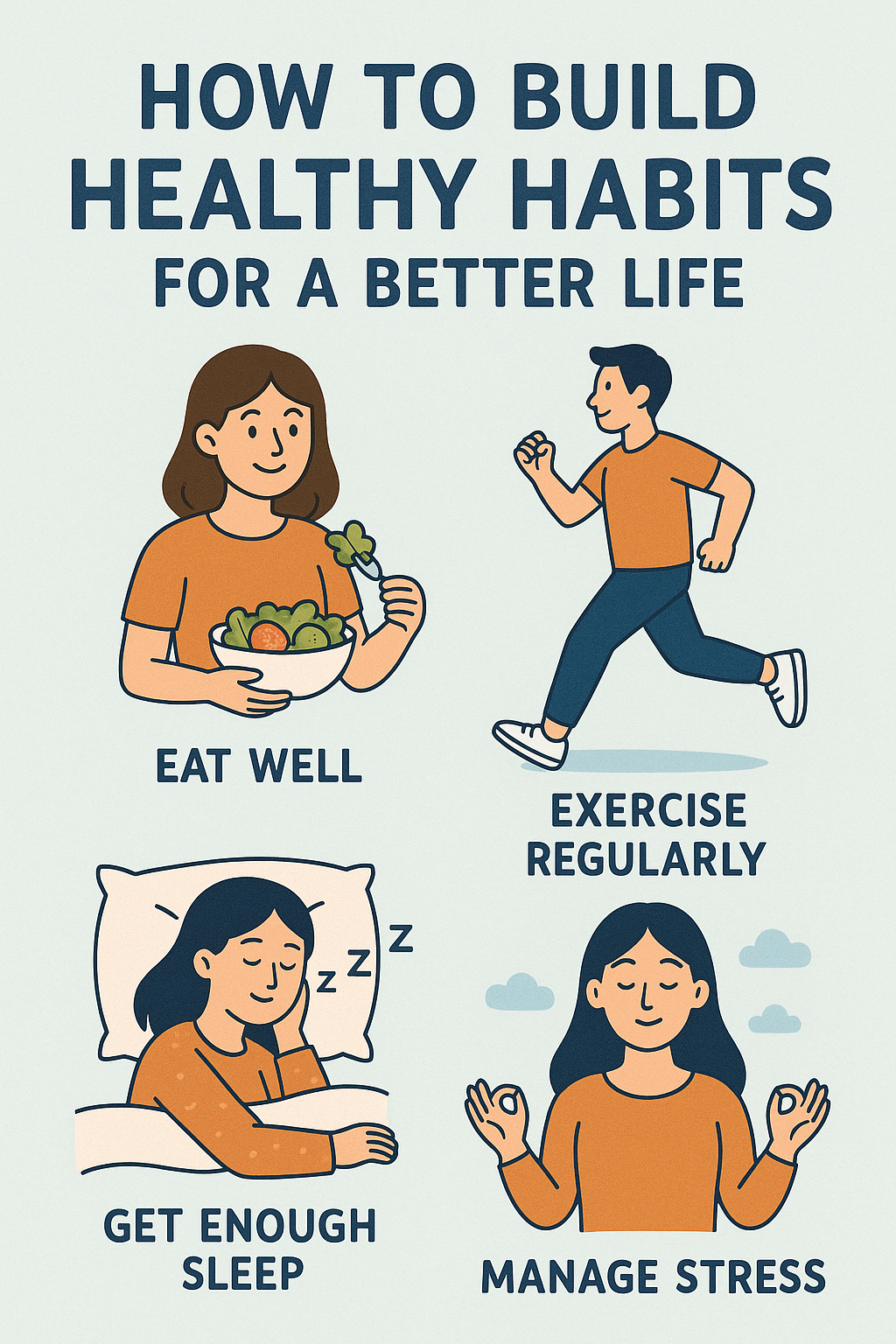Building healthy habits is one of the most powerful ways to improve your overall quality of life. Habits shape our daily routine, and the choices we make consistently can have a significant impact on our physical, mental, and emotional well-being. Whether you want to improve your fitness, eat healthier, manage stress, or boost productivity, establishing healthy habits is key to achieving long-term success. In this article, we’ll explore strategies for building healthy habits that will enhance your life.
1. Start Small and Build Gradually
When trying to build a new habit, it’s important to start small. Trying to make big changes all at once can be overwhelming and unsustainable. Instead, focus on making small adjustments that you can easily incorporate into your daily routine. Gradually building on these small steps will help you create lasting habits without feeling overwhelmed.
Tip: Start with one small habit, such as drinking more water or taking a 10-minute walk each day. Once this becomes a part of your routine, add another small habit, and build gradually.
2. Set Clear and Specific Goals
Having clear, specific goals makes it easier to track progress and stay motivated. Vague or abstract goals can lead to confusion and frustration. By defining exactly what you want to achieve, you increase your chances of success and make it easier to stay committed to the process.
Tip: Set SMART goals (Specific, Measurable, Achievable, Relevant, Time-bound) for your habits. For example, instead of saying, “I want to exercise more,” say, “I will exercise for 30 minutes, three times a week.”
3. Be Consistent, Not Perfect
Consistency is the key to building habits. It’s better to practice a healthy habit every day, even imperfectly, than to try and do it perfectly once in a while. Over time, consistency builds momentum, making it easier to stick with your habits.
Tip: Focus on making small, consistent efforts each day. Don’t aim for perfection just stay committed, and trust that progress will follow.
4. Track Your Progress
Tracking your progress helps you stay motivated and accountable. When you can see how far you’ve come, it reinforces the positive behavior and keeps you focused on the next step. It also allows you to identify patterns and areas where you may need to adjust your approach.
Tip: Use a habit tracker app, journal, or calendar to track your daily habits. Record each time you complete a habit, and celebrate your progress at the end of the week.
5. Find Motivation in Your “Why”
Understanding the reason behind your habit is essential for staying committed. Whether it’s to improve your health, boost your energy, or achieve a specific goal, knowing why the habit matters to you helps maintain motivation. A strong “why” keeps you focused, especially when obstacles arise.
Tip: Write down your reasons for building the habit, and keep them visible. When you feel discouraged, revisit your “why” to remind yourself of the benefits you’re working toward.
6. Make Your Environment Supportive
Your environment plays a significant role in shaping your habits. A supportive environment can make it easier to adopt healthy behaviors, while a cluttered or distracting environment can hinder your progress. Creating a space that aligns with your goals helps reinforce your commitment.
Tip: Set up your environment to support your habits. For example, if you want to eat healthier, stock your kitchen with nutritious foods and remove unhealthy options. If you’re working on a fitness habit, keep your workout gear visible and accessible.
7. Build Accountability
Accountability is a powerful motivator for sticking with your habits. When you have someone to share your goals with, check in on your progress, and offer support, you’re more likely to stay committed. Accountability can come from a friend, family member, colleague, or even a support group.
Tip: Share your habit-building goals with someone you trust. Regularly check in with them to update your progress and receive encouragement. Alternatively, join a group or find a workout buddy for added accountability.
8. Don’t Be Afraid to Adjust
Building habits is a process, and it’s okay to adjust your approach along the way. If something isn’t working or if you’re not enjoying the habit, don’t be afraid to tweak it. Flexibility ensures that the habit remains sustainable and fits your lifestyle.
Tip: If a habit feels too challenging or time-consuming, scale it back or adjust it to make it more manageable. For example, if 30-minute workouts feel overwhelming, start with 15-minute sessions and work your way up.
9. Reward Yourself for Progress
Rewarding yourself for sticking to your habits helps reinforce the behavior and provides positive motivation. When you see that your efforts are leading to rewards, it encourages you to continue making progress.
Tip: Set up a reward system for yourself. After completing a certain number of days or milestones, treat yourself to something you enjoy whether it’s a special meal, a fun activity, or a relaxing day off.
10. Be Patient with Yourself
Building habits takes time, and setbacks are a natural part of the process. Don’t expect immediate results, and don’t be discouraged if you miss a day or encounter a challenge. Be patient with yourself and recognize that lasting change is built over time.
Tip: Practice self-compassion. If you slip up, don’t get discouraged. Acknowledge the setback, learn from it, and continue working toward your goal. Patience and persistence are key to building healthy habits.
